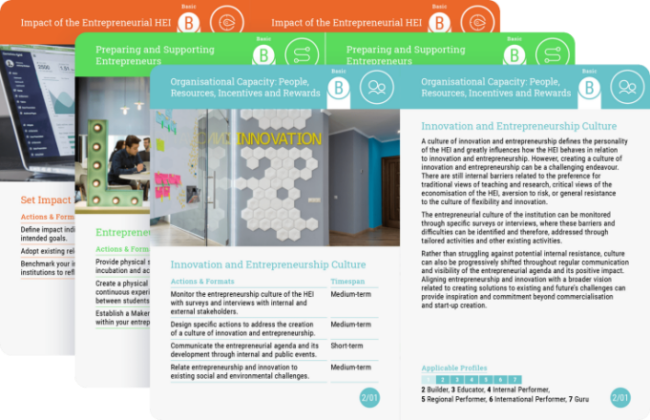HEInnovate is a self-reflection tool for Higher Education Institutions who wish to explore their innovative potential. It guides you through a process of identification, prioritisation and action planning in eight key areas. The self-assessment is available in all EU languages.
HEInnovate is not a benchmarking tool. It diagnoses areas of strength and weaknesss, opens up discussion on the entrepreneurial/innovative nature of your institution and allows you to compare and contrast evolution over time. You can have instant access to your results, learning materials and a pool of experts. HEInnovate can be used by all types of higher education institutions. It is free, confidential and open to anyone to use. Read more.
NEW: To further support Higher Education Institutions in their entrepreneurial development, seven profiles and corresponding sets of recommendations are now available for actions toward more innovative institutions! Read more
HEInnovate is an initiative of the European Commission launched in 2013 in partnership with the OECD. As a concept, it is embedded in numerous EU policy initiatives and funding programmes. Read more.
Entrepreneurial leadership and accountable governance are crucial to developing an entrepreneurial and innovative culture within an HEI. Such leadership defines entrepreneurship as a strategic priority and takes entrepreneurial and innovative practices from one-off experiment to an integrated approach that is core to how the HEI undertakes teaching, research and knowledge exchange.
The organisational capacity of an HEI drives its ability to deliver on its entrepreneurial strategy. If an HEI is committed to carrying out entrepreneurial activities to support its strategic objectives, then key resources such as people, funding and investments, expertise and knowledge, reward and incentive systems need to be in place to sustain and grow its capacity for entrepreneurship and innovation.
and Learning
Entrepreneurial teaching and learning involves exploring pedagogies, practices and flexible learning pathways to stimulate entrepreneurial mindsets in an inclusive and sustainable way. While the idea of creating a start-up remains a powerful and versatile pedagogical tool, entrepreneurship education is not just learning about how to transform an idea into a sustainable business. It is also about being exposed to entrepreneurial experiences and acquiring the skills and competences for developing an entrepreneurial mindset and equipping students to be able to contribute to addressing challenging issues such as sustainability and the UN Sustainable Development Goals (SDGs).
HEIs can help students, graduates and staff consider starting a business as a career option. At the outset it is important to help individuals reflect on the commercial, social, environmental, and lifestyle objectives related to their entrepreneurial aspirations and intentions. For those who decide to proceed to start a business, or other type of venture, targeted assistance can then be offered in generating, evaluating and acting upon the idea, building the skills necessary for successful entrepreneurship, and importantly finding relevant team members and getting access to appropriate finance and effective networks. In offering such support, an HEI should ideally act as part of a wider business support ecosystem rather than operating in isolation.
and Capability
HEIs are already deploying digital technologies, however the uptake and integration varies among and within institutions. HEIs should make the most out of the opportunities presented by digital transformation and consider digital technologies as a key enabler of innovation and entrepreneurship. An HEI’s digital capability is defined as the ability to integrate, optimise and transform digital technologies to support innovation and entrepreneurship.
and Networks
An entrepreneurial and innovative HEI proactively connects with its ecosystem (intended as an array of interlinked actors pooling skills and resources to pursue a common goal) to deliver social, cultural and economic benefits. The capacity to connect with entrepreneurial ecosystems and networks represents an important catalyst for organisational innovation in the HEI. It also helps the advancement of teaching and research, and transforms the HEI into an important actor in regional development and issues related to territorial cohesion.
A sustainable entrepreneurial HEI integrates the international into the design and delivery of education, research, and knowledge exchange by introducing new questions, approaches and alternative ways of thinking. Through considering international societal challenges, including the UN SDGs, the entrepreneurial HEI is also better equipped to support its ecosystem.
Entrepreneurial and innovative higher education institutions need to understand the impact of the changes they bring about. The entrepreneurial HEI combines institutional self-perception, external reflection and an evidence-based approach. An HEI that monitors the impact of all activities connected to the entrepreneurial and innovation agenda generates valuable information and data to be used to improve its own performance. Metrics should span beyond spin-off creation, the volume and quality of intellectual property generation and research income generation. Assessment activities should focus also on graduate entrepreneurship, skills and competence development, teaching and learning outcomes, talent retention, contribution to global, national and local economic development or the impact of the institution’s broader entrepreneurial agenda.
The steps below guide you through the features and content of HEInnovate. By clicking on the carousel figures, you will gain an overview of how to use HEInnovate for an individual or group self-assessment. . You can explore how to organise your HEInnovate workshops and join various HEInnovate events and webinars. You will know more about the new Action cards with recommendations based on entrepreneurial profiles. You can also read about available resources and other initiatives related to HEInnovate.
in numbers
You can view and download case studies that showcase different institutional approaches and practices along the eight dimensions of HEInnovate,
and user stories about the experiences of various HEIs undertaking the HEInnovate assessment.
- Case studies
Linköping University (LiU), a young higher education institution in southern Sweden, has systematically built capacity for entrepreneurship and innovation. The University’s organisation as such is deliberately interdisciplinary in order to foster innovation: twelve Departments offer research and education to all of the University’s four Faculties. Two entities are dedicated to support entrepreneurial students and staff: the Project, Innovations and Entrepreneurship (PIE) division and LiU Innovation. PIE focuses on research and teaching, while LiU Innovation supports researchers, arranges...
- User stories
by Juliana Vassileva Abstract: New Bulgarian University (NBU) used HEInnovate to evaluate and improve its entrepreneurial ecosystem. Involving students and faculty, the tool helped identify current activities, inspire new ideas, and encourage reflection. It boosted teamwork within the university, project-based additional initiatives and connections with Sofia’s startup community. HEInnovate was more than a diagnostic tool — it sparked cultural alignment and more purposeful complimentary activities across NBU. What is your role and what is the context of your institution? I am Juliana Vassileva...
The expert group is an important driving force behind taking HEInnovate forward.
In this section you can read the profiles of our experts and contact them.
Read the latest HEInnovate news and see our upcoming events.
You can also sign up to our news and newsletter to receive notifications.
Barcelona, 25 June 2025 – Set against the vibrant backdrop of Barcelona’s innovation ecosystem, the first CEI Study Visit of 2025 took place on 18–19 June, focusing on Entrepreneurial Skills and Mindsets in Education: From Ideas to Action. Hosted by the Centre for Funding and Innovation (CFI...
Berlin, 19 June 2025 – The first HEInnovate Train-the-Trainer (TtT) workshop of 2025 took place on 18–19 June at the Berlin School of Economics and Law, bringing together 24 participants from +15 countries, including members of European University Alliances and institutions across Europe and its...
HEInnovate is advancing its collaboration with European Universities alliances to support their strategic development in innovation and entrepreneurship. As multi-institutional partnerships play an increasingly prominent role in Europe’s higher education landscape, HEInnovate provides a structured...





























